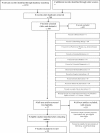Do couple-based interventions make a difference for couples affected by cancer? A systematic review
- PMID: 22769228
- PMCID: PMC3464780
- DOI: 10.1186/1471-2407-12-279
Do couple-based interventions make a difference for couples affected by cancer? A systematic review
Abstract
Background: With the growing recognition that patients and partners react to a cancer diagnosis as an interdependent system and increasing evidence that psychosocial interventions can be beneficial to both patients and partners, there has been a recent increase in the attention given to interventions that target couples. The aim of this systematic review was to identify existing couple-based interventions for patients with cancer and their partners and explore the efficacy of these interventions (including whether there is added value to target the couple versus individuals), the content and delivery of couple-based interventions, and to identify the key elements of couple-based interventions that promote improvement in adjustment to cancer diagnosis.
Method: A systematic review of the cancer literature was performed to identify experimental and quasi-experimental couple-based interventions published between 1990 and 2011. To be considered for this review, studies had to test the efficacy of a psychosocial intervention for couples affected by cancer. Studies were excluded if they were published in a language other than English or French, focused on pharmacological, exercise, or dietary components combined with psychosocial components, or did not assess the impact of the intervention on psychological distress (e.g., depression, anxiety) or quality of life. Data were extracted using a standardised data collection form, and were analysed independently by three reviewers.
Results: Of the 709 articles screened, 23 were included in this review. Couple-based interventions were most efficacious in improving couple communication, psychological distress, and relationship functioning. Interventions had a limited impact on physical distress and social adjustment. Most interventions focused on improving communication and increasing understanding of the cancer diagnosis within couples. Interventions were most often delivered by masters-level nurses or clinical psychologists. Although most were delivered in person, few were telephone-based. No difference in efficacy was noted based on mode of delivery. Factors associated with uptake and completion included symptom severity, available time and willingness to travel.
Conclusion: Given effect sizes of couple-based interventions are similar to those reported in recent meta-analyses of patient-only and caregiver-only interventions (~d=.35-.45), it appears couple-based interventions for patients with cancer and their partners may be at least as efficacious as patient-only and caregiver-only interventions. Despite evidence that couple-based interventions enhance psycho-social adjustment for both patients and partners, these interventions have not yet been widely adopted. Although more work is needed to facilitate translation to routine practice, evidence reviewed is promising in reducing distress and improving coping and adjustment to a cancer diagnosis or to cancer symptoms.
References
-
- Australian Institute of Health and Welfare (AIHW) Australasian Association of Cancer Registries (AACR) Cancer in Australia: an overview, 2008. Cancer series no. 46. AIHW, Canberra; 2008.
-
- Hagedoorn M, Sanderman R, Bolks HN, Tuinstra J, Coyne JC. Distress in couples coping with cancer: A meta-analysis and critical review of role and gender effects. Psychol Bull. 2008;134(1):1–30. - PubMed
-
- Manne SL, Ostroff JS, Winkel G, Fox K, Grana G, Miller E, Ross S, Frazier T. Couple-focused group Intervention for women with early stage breast cancer. J Consult Clin Psychol. 2005;73(4):634–646. - PubMed
-
- Scott JL, Halford WK, Ward BG. United we stand? The effects of a couple-coping intervention on adjustment to early stage breast or gynecological cancer. J Consult Clin Psychol. 2004;72(6):1122–1135. - PubMed
-
- Lazarus RS, Folkman S. Stress, appraisal, and coping. Springer, New York; 1984.
Publication types
MeSH terms
LinkOut - more resources
Full Text Sources
Medical


